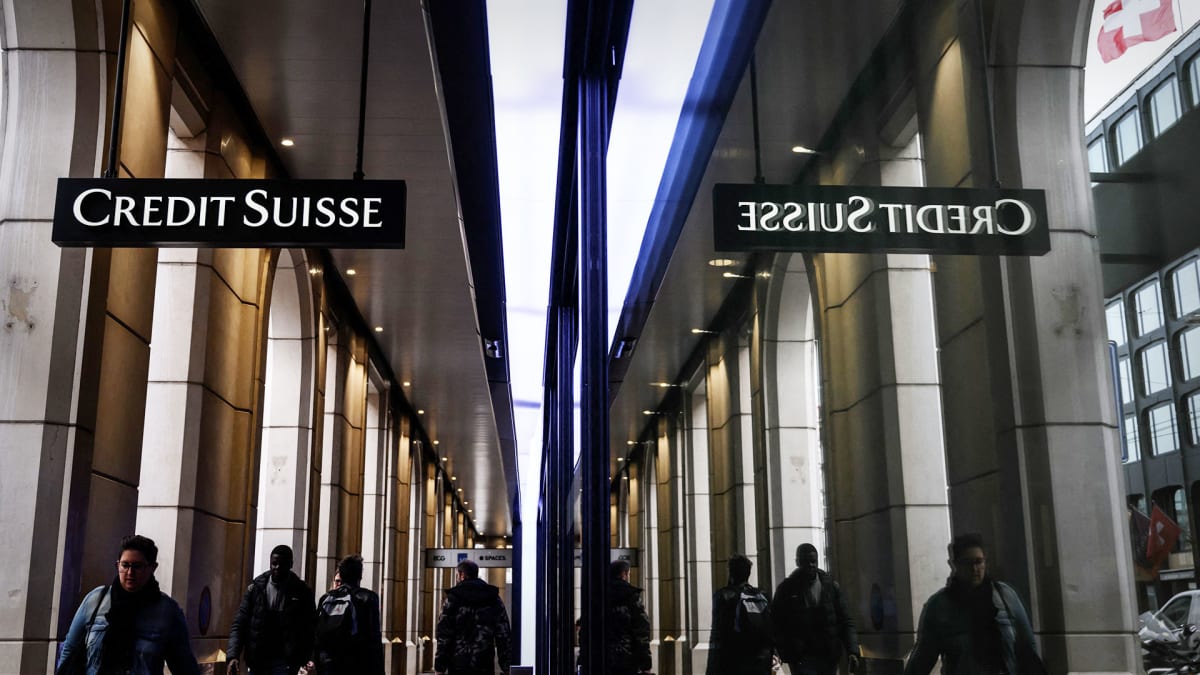
Credit Suisse didn't need this.
The bank, founded 166 years ago, is fighting to survive. It wants to convince the market that it still has a future.
Meantime, its market capitalization has collapsed and literally makes it an M&A target Once one of Europe's flagship banks, Credit Suisse has seen its market cap fall to just 10.5 billion Swiss francs ($10.55 billion) at last check.
The bank is thus valued at less than Coinbase (COIN), the cryptocurrency trading platform, which has a market capitalization of $16.8 billion. It's barely better than Robinhood (HOOD), the Gen Z brokerage, whose market value is $9.7 billion.
Credit Suisse's survival efforts don't seem very convincing, according to S&P Global Ratings. The credit-rating firm has just downgraded the long-term financial strength rating of Credit Suisse, putting it a notch above junk status. Credit Suisse's long-term rating is now BBB-, down from BBB.
'Weakened Franchise'
The outlook is stable, which suggests that S&P does not intend to change it in the short term unless a major event occurs.
The rating downgrade may lead to higher funding costs for Credit Suisse as creditors may require more collateral for the risks they are taking.
By pushing Credit Suisse to the brink of junk, or "speculative grade" (which kicks in at BB), the ratings firm explained that there are "material execution risks amid [a] deteriorating and volatile economic and market environment."
"Credit Suisse's third-quarter earnings pointed to a weakened franchise as its leading wealth-management business proved less resilient than previously anticipated, demonstrated by client money outflows and an inflexible cost base," said S&P Global Ratings in a note on Nov. 1.
The ratings firm made clear its doubts about the vast restructuring plan the bank unveiled on Oct. 27.
Credit Suisse's revamp, considered an emergency plan to clear up uncertainty about its future, has three pillars.
The first is a drastic cost reduction. The firm wants to cut 9,000 jobs by 2025, including just over 2,700, or 5% of the workforce, by Dec, 31. Overall, Credit Suisse wants to reduce its cost base by 14.5 billion Swiss francs in three years.
The second pillar is the breakup of the investment bank into three parts. The investment bank was once the company's cash cow, but a series of scandals have cost Credit Suisse several billion dollars in losses and fines imposed by regulators.
The firm will form a Markets unit to provide financial services and products to the clients of the wealth management division and to institutional investors.
The bank is also resurrecting Credit Suisse First Boston, a U.S. firm formed after the acquisition of First Boston decades ago, to compete with Goldman Sachs and other investment banks in the U.S. Credit Suisse First Boston is set to become independent over time. The unit will do everything an investment bank is supposed to do.
Facing Pressure
The third and last pillar is a capital increase of 4 billion Swiss francs ($4.04 billion) by issuing new shares, which will be used to finance the plan. Saudi National Bank, a state-controlled firm, has committed to invest up to 1.9 billion Swiss francs in exchange for a 9.9% stake.
The restructuring will cost 2.9 billion Swiss francs through 2024.
While Credit Suisse has also announced the sale of a "significant portion" of its Securitized Products Group business, the question investors are asking is how the bank will execute this plan under the current macroeconomic conditions.
Factors include the Russia-Ukraine war, which has caused an energy crisis in Europe, and inflation at its highest in 40 years. That's creating volatility in the markets and is raising fears of a global recession.
Another is the company's financial results. Credit Suisse posted a net loss of 4.03 billion Swiss francs ($4.07 billion) against net income of 434 million Swiss francs ($438 million) for the third quarter of 2022.
Chairman Alex Lehmann said the bank is not for sale despite speculation.
For its part, the Moody's credit-rating firm downgraded Credit Suisse's senior unsecured debt to A3 from A2. The company's senior unsecured debt rating remains at Baa2.
Moody's, however, left the outlook for these ratings at negative, suggesting that it may lower them in the near term. The rating firm explained its decision by saying that Credit Suisse is under pressure to return to profitability as soon as possible and faces risks around the restructuring plan.







